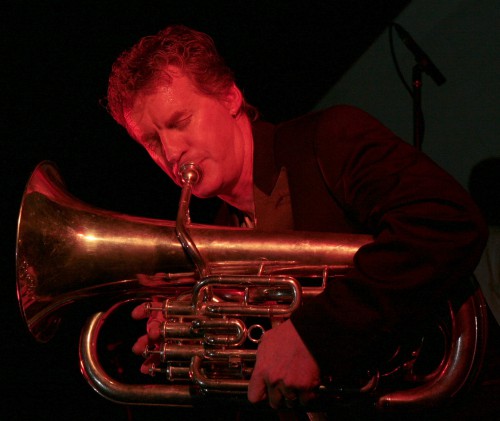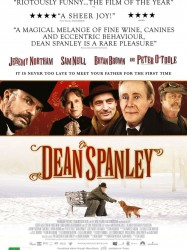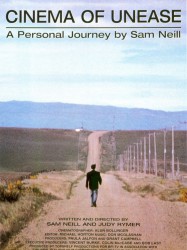Don McGlashan est un Son et Créateur de musique additionnelle Néo-Zélandais né le 18 juillet 1959

Don McGlashan (born 18 July 1959) is a New Zealand musician and songwriter who won fame with bands Blam Blam Blam, The Front Lawn, and The Mutton Birds. He has also played with The Bellbirds, The Plague, The Whizz Kids and percussion group From Scratch. McGlashan has composed music for film, television, and New Zealand's Limbs Dance Company.
McGlashan's first hits were with band Blam Blam Blam in the early 1980s. He later released four albums as lead singer of The Mutton Birds.
McGlashan was born in Auckland, New Zealand, with three siblings. Both his parents were teachers: his father Bain taught civil engineering at Auckland Technical Institute and his mother was a schoolteacher. McGlashan was actively encouraged to pursue music from a young age by his father, who bought him bought parts of various musical instruments to learn on. McGlashan wrote the song 'Envy of Angels' as a tribute to his father.
At age seven McGlashan began on cello and piano and "then gradually added more instruments to that. [I] went through the tune-a-day for whatever instrument it was, for just about every instrument I think."
McGlashan attended Westlake Boys' High School, on Auckland's North Shore. While at high school he began playing keyboard in local bands and studying the French horn. "I carried on sort of following those two strands - of learning how to write songs, learning how to be in a band, learning all the sort of extra musical stuff that you have to learn - and on the other side I was learning the French horn."
He studied English and Music at Auckland University, and played French horn and percussion in the Auckland Sinfonia from 1979-82. McGlashan began working with the punk group From Scratch in 1979, while playing in the Auckland Sinfonia. McGlashan played a number of more eclectic percussion instruments, such as PVC piping struck with jandals; the name of the group came from the fact that they produced their own instruments 'from scratch'. On Standards, the album he jointly produced with Ivan Zagni for Propeller Records in 1982, he is credited as playing bass guitar, horn, whistle, percussion, marimba and vocals.
1981-1984: Blam Blam Blam, dance scoring
In 1981, McGlashan replaced Ian Gilroy in the punk band The Whizz Kids, who rechristened themselves Blam Blam Blam. McGlashan's song "Don't Fight It Marsha, It's Bigger Than Both of Us" reached #17 in the New Zealand charts, and deemed by Rip It Up magazine as 'best single of the year'. Readers voted McGlashan best drummer of the year.
1985-1990: The Front Lawn, movie composition
McGlashan formed the music/theatre/film group The Front Lawn with Harry Sinclair. In the band he took on guitar duties as well. He wrote the song 'Andy' in memory of his late brother. The song would feature in the APRA Top 100 New Zealand Songs of All Time. The song "The Lounge Bar" was made into a short film that was critically acclaimed and played at a number of film festivals.
While the films were used as a means of better capitalising on the bands success than long strings of small concert venues, both McGlashan and Sinclair began to move away from the band to writing songs and directing respectively. McGlashan in particular was keen to return to the live circuit, though he was also doing film composition such as An Angel At My Table.
1991–2002: The Mutton Birds
While McGlashan did film and theatre work, David Long moved from Wellington to Auckland and the two of them began working together and auditioning drummers. After playing their first gig on St Patricks Day 1991 with a session drummer, they heard of Ross Berge and convinced him to move back to New Zealand from New York to join the band. The band began to become successful—"Anchor Me" won McGlashan the 1994 Silver Scroll Award—and moved to the UK. However, while the Mutton Birds received acclaim from UK critics and music magazines, they failed to achieve mainstream success. The band eventually disbanded and McGlashan returned to New Zealand.
Over this time, McGlashan also collaborated with other New Zealand musicians, playing the euphonium in tracks by Dave Dobbyn ('It Dawned On Me') and Tim Finn.
2003-present: Solo work
After the breakup of the Mutton Birds, McGlashan returned to composition. His song "Bathe In the River" for the film No. 2. and featuring Holly Smith reached number 2 on the New Zealand music charts and went platinum. The song also won him the 2006 APRA Silver Scroll Award, his second win.
In 2005, "Anchor Me" was re-recored to commemorate the 20th anniversary of the Greenpeace Rainbow Warrior bombing. McGlashan allowed the song to be used but did not perform on it out of the concern that it would turn the attention to him rather than the event the charity song was to represent.
After the Standards project with Ivan Zagni, McGlashan's first solo album, entitled Warm Hand, was released in May 2006. In March 2009, the Marvellous Year album was released through Arch Hill Records. This album is the first to be credited to 'Don McGlashan & the Seven Sisters'. It includes a new version of the hit 'Bathe in the River', this time with McGlashan on lead vocals.
McGlashan played the euphonium on Time On Earth, by Crowded House. He played live with Crowded House at Glastonbury 2008 and has been a regular member of the touring line-up throughout their 2008 world tour.
In 2011 McGlashan provided the score to the fireworks during the opening ceremony of the 2011 Rugby World Cup. At the 2012 Apra Silver Scroll Awards he spoke of the power of songwriting and the changing New Zealand music scene.
McGlashan played euphonium on the track 'Hole In My Head' by Melbourne singer/songwriter Marjorie Cardwell, on her album 'In Another World', released in 2012.
In 2012 McGlashan was part of a select number of artists given permission to visit Antarctica, and in 2013 he was awarded the two month Michael King residency.
Source : Wikidata
Don McGlashan

McGlashan's first hits were with band Blam Blam Blam in the early 1980s. He later released four albums as lead singer of The Mutton Birds.
Biographie
Early lifeMcGlashan was born in Auckland, New Zealand, with three siblings. Both his parents were teachers: his father Bain taught civil engineering at Auckland Technical Institute and his mother was a schoolteacher. McGlashan was actively encouraged to pursue music from a young age by his father, who bought him bought parts of various musical instruments to learn on. McGlashan wrote the song 'Envy of Angels' as a tribute to his father.
At age seven McGlashan began on cello and piano and "then gradually added more instruments to that. [I] went through the tune-a-day for whatever instrument it was, for just about every instrument I think."
McGlashan attended Westlake Boys' High School, on Auckland's North Shore. While at high school he began playing keyboard in local bands and studying the French horn. "I carried on sort of following those two strands - of learning how to write songs, learning how to be in a band, learning all the sort of extra musical stuff that you have to learn - and on the other side I was learning the French horn."
He studied English and Music at Auckland University, and played French horn and percussion in the Auckland Sinfonia from 1979-82. McGlashan began working with the punk group From Scratch in 1979, while playing in the Auckland Sinfonia. McGlashan played a number of more eclectic percussion instruments, such as PVC piping struck with jandals; the name of the group came from the fact that they produced their own instruments 'from scratch'. On Standards, the album he jointly produced with Ivan Zagni for Propeller Records in 1982, he is credited as playing bass guitar, horn, whistle, percussion, marimba and vocals.
1981-1984: Blam Blam Blam, dance scoring
In 1981, McGlashan replaced Ian Gilroy in the punk band The Whizz Kids, who rechristened themselves Blam Blam Blam. McGlashan's song "Don't Fight It Marsha, It's Bigger Than Both of Us" reached #17 in the New Zealand charts, and deemed by Rip It Up magazine as 'best single of the year'. Readers voted McGlashan best drummer of the year.
1985-1990: The Front Lawn, movie composition
McGlashan formed the music/theatre/film group The Front Lawn with Harry Sinclair. In the band he took on guitar duties as well. He wrote the song 'Andy' in memory of his late brother. The song would feature in the APRA Top 100 New Zealand Songs of All Time. The song "The Lounge Bar" was made into a short film that was critically acclaimed and played at a number of film festivals.
While the films were used as a means of better capitalising on the bands success than long strings of small concert venues, both McGlashan and Sinclair began to move away from the band to writing songs and directing respectively. McGlashan in particular was keen to return to the live circuit, though he was also doing film composition such as An Angel At My Table.
1991–2002: The Mutton Birds
While McGlashan did film and theatre work, David Long moved from Wellington to Auckland and the two of them began working together and auditioning drummers. After playing their first gig on St Patricks Day 1991 with a session drummer, they heard of Ross Berge and convinced him to move back to New Zealand from New York to join the band. The band began to become successful—"Anchor Me" won McGlashan the 1994 Silver Scroll Award—and moved to the UK. However, while the Mutton Birds received acclaim from UK critics and music magazines, they failed to achieve mainstream success. The band eventually disbanded and McGlashan returned to New Zealand.
Over this time, McGlashan also collaborated with other New Zealand musicians, playing the euphonium in tracks by Dave Dobbyn ('It Dawned On Me') and Tim Finn.
2003-present: Solo work
After the breakup of the Mutton Birds, McGlashan returned to composition. His song "Bathe In the River" for the film No. 2. and featuring Holly Smith reached number 2 on the New Zealand music charts and went platinum. The song also won him the 2006 APRA Silver Scroll Award, his second win.
In 2005, "Anchor Me" was re-recored to commemorate the 20th anniversary of the Greenpeace Rainbow Warrior bombing. McGlashan allowed the song to be used but did not perform on it out of the concern that it would turn the attention to him rather than the event the charity song was to represent.
After the Standards project with Ivan Zagni, McGlashan's first solo album, entitled Warm Hand, was released in May 2006. In March 2009, the Marvellous Year album was released through Arch Hill Records. This album is the first to be credited to 'Don McGlashan & the Seven Sisters'. It includes a new version of the hit 'Bathe in the River', this time with McGlashan on lead vocals.
McGlashan played the euphonium on Time On Earth, by Crowded House. He played live with Crowded House at Glastonbury 2008 and has been a regular member of the touring line-up throughout their 2008 world tour.
In 2011 McGlashan provided the score to the fireworks during the opening ceremony of the 2011 Rugby World Cup. At the 2012 Apra Silver Scroll Awards he spoke of the power of songwriting and the changing New Zealand music scene.
McGlashan played euphonium on the track 'Hole In My Head' by Melbourne singer/songwriter Marjorie Cardwell, on her album 'In Another World', released in 2012.
In 2012 McGlashan was part of a select number of artists given permission to visit Antarctica, and in 2013 he was awarded the two month Michael King residency.
Le plus souvent avec
Filmographie de Don McGlashan (13 films)
Son
 , 1h48
, 1h48Origine Nouvelle zelande
Genres Action, Aventure, Historique
Thèmes Sport, Arts martiaux
Acteurs Lawrence Makoare, James Rolleston, Rena Owen, George Henare, Calvin Tuteao, Antonio Te Maioha
Rôle Musicien
Note62%





Hongi, fils d'un chef Maori, doit venger son père afin de ramener la paix et d'honorer les âmes des habitants de son village, tous massacrés par une tribu rivale menée par le terrifiant Wirepa.
 , 1h32
, 1h32Origine Nouvelle zelande
Genres Comédie
Acteurs Oscar Kightley, Shimpal Lelisi, Robbie Magasiva, David Fane, Madeleine Sami, Gwendoline Taylor
Rôle Compositeur de musique originale
Note55%





Albert et Tanya sont désormais mariés mais ne sont pas résolus à avoir un enfant. À l'inverse, Sefa et Leilani ont deux enfants mais Leilani a décliné la demande en mariage de Sefa. Stanley fait son apprentissage de diacre alors que Michael est parti pour l'Australie. Les quatre amis qui se sont perdus de vue sont réunis par le pasteur pour retrouver Paul qui a disparu.

Matariki (2010)
, 1h32Réalisé par Michael Bennett
Genres Drame
Acteurs Sara Wiseman, Alix Bushnell, Camille Keenan, Pua Magasiva
Note64%





Just as the stars of the Pleiades constellation come together to mark the Matariki – the Māori New Year and a time of new beginnings – so too do the five intersecting stories of Michael Bennett’s first feature film merge into a fascinating portrait of a community.

Piece of My Heart (2009)
Genres Drame
Acteurs Rena Owen, John Bach, Emily Barclay, Keisha Castle-Hugues, Annie Whittle
Rôle Musicien
Note75%






Dean Spanley (2008)
, 1h40Genres Drame, Comédie, Comédie dramatique, Fantasy, Aventure
Thèmes Religion
Acteurs Jeremy Northam, Peter O'Toole, Sam Neill, Bryan Brown, Judy Parfitt, Dudley Sutton
Rôle Compositeur de musique originale
Note71%





The screenplay is an adaptation of fantasy author Lord Dunsany's My Talks with Dean Spanley, a 14-chapter novella published in 1936. It is set in Edwardian England.

Show of Hands (2008)
Réalisé par Anthony McCarten
Genres Drame, Comédie, Romance
Acteurs Melanie Lynskey, Craig Hall, Stephen Lovatt, Matt Whelan, Chelsie Preston Crayford, Barnie Duncan
Rôle Compositeur de musique originale
Note62%






No. 2 (2006)
Genres Drame, Comédie
Acteurs Ruby Dee, Rene Naufahu, Tuva Novotny, Antony Starr, Nathaniel Lees, Pio Terei
Rôle Compositeur de musique originale
Note64%





Nanna Maria, the matriarch of a Fijian extended family living in a suburb of Auckland, New Zealand, feels that the heart and passion has gone out of her clan. One morning, she demands that her grown grandchildren put on a big family feast at which she will name her successor. The grandchildren—Soul, Charlene, Hibiscus, Erasmus, and her favorite, Tyson—reluctantly turn up, Tyson with his new Danish girlfriend, Maria. Family conflicts play out as the difficult day progresses, but in the end the grandchildren—and eventually Nanna's children too—join with cousins and others in a traditional celebration.

Like It Is (1998)
, 1h35Origine Royaume-uni
Genres Drame, Romance
Thèmes Sexualité, Sport, Homosexualité, Arts martiaux, La boxe, LGBT, LGBT
Acteurs Roger Daltrey, Dani Behr, Emile Charles
Note63%





Matt (Rose) is a London music promoter who wants to one day own his own club. His flatmate is Paula (Behr), a pop singer whose music he helps promote. While accompanying her on a personal appearance at a gay club in Blackpool, Matt meets Craig (Bell), an unemployed youth who makes ends meet as a backroom bareknuckles fighter. They go back to Craig's place to have sex but it's Craig's first time and he freaks out. Matt leaves his card and takes off.

Cinema of Unease (1995)
, 56minutesRéalisé par Sam Neill
Genres Documentaire
Thèmes Documentaire sur le monde des affaires, Documentaire sur le cinéma
Acteurs Sam Neill
Rôle Compositeur de musique originale
Note69%






Absent Without Leave (1993)
, 1h35Réalisé par John Laing
Genres Drame, Guerre, Romance
Acteurs Craig McLachlan, Tony Barry, Ken Blackburn, Tony Burton, Francis Bell, Robyn Malcolm
Rôle Compositeur de musique originale
Note60%






The Grasscutter (1990)
, 1h50Réalisé par Ian Mune
Genres Drame, Thriller
Thèmes Le terrorisme, Politique
Acteurs Terence Cooper, Ian McElhinney, Marshall Napier, Temuera Morrison, Frances Barber
Rôle Compositeur de musique originale
Note62%






Un ange à ma table (1990)
, 2h36Réalisé par Jane Campion
Origine Nouvelle zelande
Genres Drame, Biographie
Thèmes Film sur un écrivain, Féminisme, Maladie, La mer, Transport, Folie, Politique
Acteurs Kerry Fox, Martyn Sanderson, Willa O'Neill, Andrew Robertt, Elizabeth McRae, Robert Jayne
Rôle Compositeur de musique originale
Note73%





Dans une famille nombreuse très pauvre, entourée d'un frère épileptique et de jolies sœurs, la jeune Janet, boulotte et les dents gâtées, se singularise par une tignasse rousse frisée, une sensibilité aussi aiguisée que sa timidité maladive. Elle se distingue par son goût pour la lecture, les contes, la poésie et commence à écrire très jeune. Elle est marquée par la noyade de sa sœur ainée de 10 ans.
Equipe

Giselle (2013)
, 1h44Genres Drame, Documentaire, Musical
Thèmes Danse
Rôle Créateur de musique additionnelle
Note71%





Giselle danse pour Albrecht dont elle tombe éperdument amoureuse. Quand elle découvre que son soupirant est déjà fiancé, Giselle perd la raison et s'effondre, inanimée. Bientôt, elle réapparaît sous la forme d'une wili, jeune fille transformée en fantôme. Leur amour sauvera-t-il Albrecht et Giselle d'une danse éternelle ? Le ballet romantique d'Adolphe Adam délicatement entremêlé d’une autre romance, cette fois en coulisses entre les deux danseurs étoiles.
 Connexion
Connexion



